25 start with K start with K

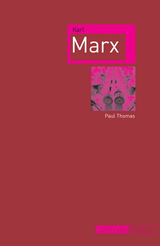
He was relatively unknown in his lifetime, but Karl Marx’s theories about society, economics, and politics changed the world, led to the Russian Revolution and the formation of the Soviet Union and the creation of the People’s Republic of China, and inspired variants from Leninism and Stalinism to Trotskyism and Maoism. Marx is one of the most influential thinkers of the modern age, but in recent times “Marxism” has become a vague, contestable, and uncertain term. In this concise, accessible book, Paul Thomas casts a clarifying light on Marx’s life and writings, providing a cogent introduction to a contemporary audience.

Kartoon Kings is the first monographic and comprehensive analysis of the graphic artwork of Simon Grennan and Christopher Sperandio. This work showcases a collection of full-color images excerpted from comic book projects, videos, billboards, and more of the artists’ collaborative public contributions created over the past fifteen years. To supplement the images an interview with the artists by Kristina Olson is included, along with essays by Joshua Decter and Paul Krainak. Grennan and Sperandio work together by conspiring about their creative ideas on the Internet. Their teamwork must be done this way because Grennan lives in England, while Sperandio lives in the United States.
More of Sperandio and Grennan’s work can be seen at www.kartoonkings.com.

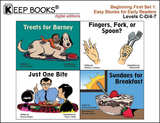
Stories include: Treats for Barney, Fingers, Fork, or Spoon?, Just One Bite, & Sundaes for Breakfast.
Age Level: 5-6
Grade Level: Beginning First
Reading level: C-D/4-7
KEEP BOOKS digital editions include text features and design elements that give beginning readers what they need to start reading on their own with high interest titles that they can easily manage.
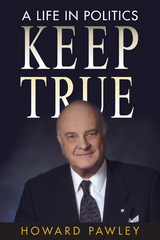
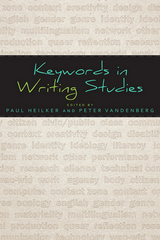
Keywords in Writing Studies is an exploration of the principal ideas and ideals of an emerging academic field as they are constituted by its specialized vocabulary. A sequel to the 1996 work Keywords in Composition Studies, this new volume traces the evolution of the field’s lexicon, taking into account the wide variety of theoretical, educational, professional, and institutional developments that have redefined it over the past two decades.
Contributors address the development, transformation, and interconnections among thirty-six of the most critical terms that make up writing studies. Looking beyond basic definitions or explanations, they explore the multiple layers of meaning within the terms that writing scholars currently use, exchange, and question. Each term featured is a part of the general disciplinary parlance, and each is a highly contested focal point of significant debates about matters of power, identity, and values. Each essay begins with the assumption that its central term is important precisely because its meaning is open and multiplex.
Keywords in Writing Studies reveals how the key concepts in the field are used and even challenged, rather than advocating particular usages and the particular vision of the field that they imply. The volume will be of great interest to both graduate students and established scholars.

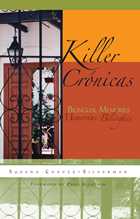
Includes a chapter that was awarded first prize in El Andar magazine’s Chicano Literary Excellence Contest in the category of personal memoir.

A canonical great poem, or mahākāvya, of the Sanskrit canon, depicting a well-known episode from the Mahābhārata.
Magha’s The Killing of Shishupala, written in the seventh century, is a celebrated example of the Sanskrit genre known as mahākāvya, or great poem. This adaptation from the epic Mahābhārata tells the story of Shishupala, who disrupts Yudhishthira’s coronation by refusing to honor Krishna, the king’s principal ally and a manifestation of divinity. When Shishupala challenges Krishna to combat, he is immediately beheaded.
Magha, who was likely a court poet in western India, draws on the rich stylistic resources of Sanskrit poetry to imbue his work with unparalleled sophistication. He expands the narrative’s cosmic implications through elaborate depictions of the natural world and intense erotic sensuality, mixing myth and classical erudition with scenes of political debate and battlefield slaughter. Krishna is variously portrayed as refined prince, formidable warrior, and incarnation of the god Vishnu protecting the world from demonic threat.
With this translation of The Killing of Shishupala, presented alongside the original text in the Devanagari script, English readers for the first time gain access to a masterwork that has dazzled Indian audiences for a thousand years.
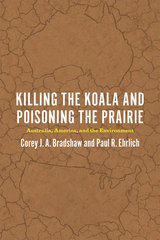
In this book, Bradshaw and Ehrlich provide a spirited exploration of the ways in which the United States and Australia can learn from their shared problems and combine their most successful solutions in order to find and develop new resources, lower energy consumption and waste, and grapple with the dynamic effects of climate change. Peppering the book with humor, irreverence, and extensive scientific knowledge, the authors examine how residents of both countries have irrevocably altered their natural environments, detailing the most pressing ecological issues of our time, including the continuing resource depletion caused by overpopulation. They then turn their discussion to the politics behind the failures of environmental policies in both nations and offer a blueprint for what must be dramatically changed to prevent worsening the environmental crisis.
Although focused on two nations, Killing the Koala and Poisoning the Prairie clearly has global implications—the problems facing the United States and Australia are not theirs alone, and the solutions to come will benefit by being crafted in coalition. This book provides a vital opportunity to learn from both countries’ leading environmental thinkers and to heed their call for a way forward together.
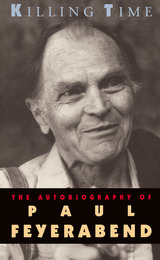
Trained in physics and astronomy, Feyerabend was best known as a philosopher of science. But he emphatically was not a builder of theories or a writer of rules. Rather, his fame was in powerful, plain-spoken critiques of "big" science and "big" philosophy. Feyerabend gave voice to a radically democratic "epistemological anarchism:" he argued forcefully that there is not one way to knowledge, but many principled paths; not one truth or one rationality but different, competing pictures of the workings of the world. "Anything goes," he said about the ways of science in his most famous book, Against Method. And he meant it.
Here, for the first time, Feyerabend traces the trajectory that led him from an isolated, lower-middle-class childhood in Vienna to the height of international academic success. He writes of his experience in the German army on the Russian front, where three bullets left him crippled, impotent, and in lifelong pain. He recalls his promising talent as an operatic tenor (a lifelong passion), his encounters with everyone from Martin Buber to Bertolt Brecht, innumerable love affairs, four marriages, and a career so rich he once held tenured positions at four universities at the same time.
Although not written as an intellectual autobiography, Killing Time sketches the people, ideas, and conflicts of sixty years. Feyerabend writes frankly of complicated relationships with his mentor Karl Popper and his friend and frequent opponent Imre Lakatos, and his reactions to a growing reputation as the "worst enemy of science."

Winner of the 2015 Margaret Mead Award from the American Anthropological Association and the Society for Applied Anthropology
After Haiti’s 2010 earthquake, over half of U.S. households donated to thousands of nongovernmental organizations (NGOs) in that country. Yet we continue to hear stories of misery from Haiti. Why have NGOs failed at their mission?
Set in Haiti during the 2004 coup and aftermath and enhanced by research conducted after the 2010 earthquake, Killing with Kindness analyzes the impact of official development aid on recipient NGOs and their relationships with local communities. Written like a detective story, the book offers rich ethnographic comparisons of two Haitian women’s NGOs working in HIV/AIDS prevention, one with public funding (including USAID), the other with private European NGO partners. Mark Schuller looks at participation and autonomy, analyzing donor policies that inhibit these goals. He focuses on NGOs’ roles as intermediaries in “gluing” the contemporary world system together and shows how power works within the aid system as these intermediaries impose interpretations of unclear mandates down the chain—a process Schuller calls “trickle-down imperialism.”

For more than four decades, Charles Bernstein has been at the forefront of experimental poetry, ever reaching for a radical poetics that defies schools, periods, and cultural institutions. The Kinds of Poetry I Want is a celebration of invention and includes not only poetry but also essays on aesthetics and literary studies, interviews with other poets, autobiographical sketches, and more.
At once a dialogic novel, long poem, and grand opera, The Kinds of Poetry I Want arrives amid renewed attacks on humanistic expression. In his polemical, humorous style, Bernstein faces these challenges head-on and affirms the enduring vitality and attraction of poetry, poetics, and literary criticism.
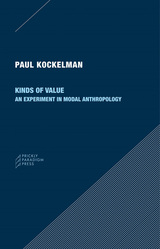

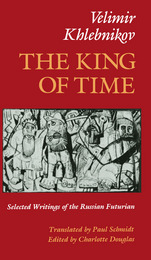
Velimir Khlebnikov, who died in 1922 at the age of thirty-six, is one of the great, untranslated Russian poets of this century. Hailed by his contemporaries and by later writers and scholars as the creative genius behind the Russian Futurist movement, Khlebnikov is famous more for his inaccessibility than for the excellence of what he actually produced. Even Russians are generally baffled by him.
Now, in a powerful American rendition, we are given access to the strange and beautiful world of Khlebnikov, “the word’s wild highwayman.” Trained in the natural sciences and mathematics and by temperament an artist, Khlebnikov thought he had discovered the Laws of Time and Tables of Destiny, by which enlightened humans could live in harmony with themselves and with nature. He coined the terms “Futurian” and “Presidents of Planet Earth” for himself and his friends, and he devoted all of his short, restless life to finding a language appropriate to his vision. Experiments with words became magical paths to a reinvigorated future, and produced some of the most extraordinary poems in the Russian language.
These goals and researches were variously embodied as well in stories, plays, and visionary essays in which Khlebnikov advances architectural plans for mobile cities, a new alphabet based on universal meanings of sounds, and communication by way of vast television networks. The result is poetry of startling originality, modernity, and linguistic virtuosity—a true challenge to translators and one that has been met brilliantly here by Paul Schmidt and Charlotte Douglas.
The King of Time is a representative sampling of Khlebnikov’s writings, taken from the translation of his complete works prepared under the auspices of the Dia Art Foundation. It includes many pieces, among them the full text of the astounding poem-play Zangezi, never before translated. General readers will be introduced to the legendary Khlebnikov, and cognoscenti will applaud the inventiveness of the rendering.
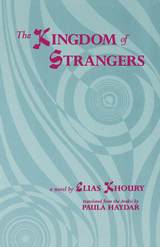
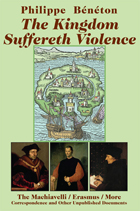
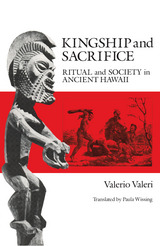
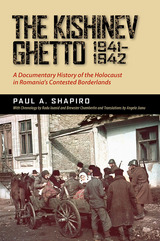
The Kishinev Ghetto, 1941–1942 sheds new light on the little-known historical events surrounding the creation, administration, and liquidation of the Kishinev (Chisinau) ghetto during the first months following the Axis attack on the Soviet Union (Operation Barbarossa) in late June 1941. Mass killings during the combined Romanian-German drive toward Kishinev in Bessarabia, after a year of Soviet rule in this Romanian border province, were followed by the shooting of thousands of Jews on the streets of the city during the first days of reestablished Romanian administration. Survivors were driven into a ghetto, persecuted, and liquidated by year’s end. The Kishinev Ghetto, 1941–1942 is the first major study of these events.
Often overshadowed by events in Germany and Poland, the history of the Holocaust in Romania, including what took place in Bessarabia (corresponding in large part with the territory of the modern Republic of Moldova), was obscured during decades of communist rule by denial and by policies that blocked access to wartime documentation. This book is the result of a lengthy research project that began with Paul A. Shapiro’s missions to Romania for the United States Holocaust Memorial Museum to negotiate access to these documents.
The volume includes:
· A preface describing the origin of the project in the immediate aftermath of the Ceausescu regime in Romania.
· A hundred-page study setting the events of the book within the historical context of Eastern European antisemitism, Romanian-Soviet conflict over control of Bessarabia, and Romania’s alliance with Nazi Germany.
· A thoughtfully curated collection of archival documents linked to the study.
· A chronology of related historical events.
· Twenty-one black and white photographs and a map of the ghetto.
Students and scholars of Holocaust history, Judaic studies, twentieth-century Eastern European history, Romania, Moldova, and historical Bessarabia will want to own this important, revealing volume.
Published in association with the United States Holocaust Memorial Museum
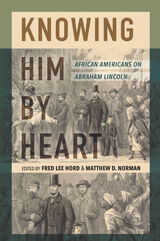
An unprecedented collection of African American writings on Lincoln
Though not blind to Abraham Lincoln's imperfections, Black Americans long ago laid a heartfelt claim to his legacy. At the same time, they have consciously reshaped the sixteenth president's image for their own social and political ends. Frederick Hord and Matthew D. Norman's anthology explores the complex nature of views on Lincoln through the writings and thought of Frederick Douglass, Ida B. Wells-Barnett, Mary McLeod Bethune, Thurgood Marshall, Malcolm X, Gwendolyn Brooks, Barbara Jeanne Fields, Barack Obama, and dozens of others. The selections move from speeches to letters to book excerpts, mapping the changing contours of the bond--emotional and intellectual--between Lincoln and Black Americans over the span of one hundred and fifty years.
A comprehensive and valuable reader, Knowing Him by Heart examines Lincoln’s still-evolving place in Black American thought.
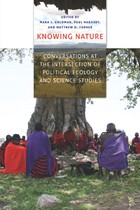
Political ecology and science studies have found fertile meeting ground in environmental studies. While the two distinct areas of inquiry approach the environment from different perspectives—one focusing on the politics of resource access and the other on the construction and perception of knowledge—their work is actually more closely aligned now than ever before.
Knowing Nature brings together political ecologists and science studies scholars to showcase the key points of encounter between the two fields and how this intellectual mingling creates a lively and more robust ecological framework for the study of environmental politics. The contributors all actively work at the interface between these two fields, and here they use empirical material to explore questions of theoretical and practical import for understanding the politics that surround nature-society relations, from wildlife management in the Yukon to soil fertility in Kenya. In addition, they examine how various environmental knowledge claims are generated, packaged, promoted, and accepted (or rejected) by the different actors involved in specific cases of environmental management, conservation, and development. Finally, they ask what is at stake in the struggles surrounding environmental knowledge, how such struggles shape conceptions of the environment, and whose interests are served in the process.
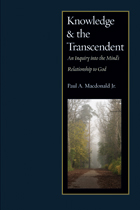

READERS
Browse our collection.
PUBLISHERS
See BiblioVault's publisher services.
STUDENT SERVICES
Files for college accessibility offices.
UChicago Accessibility Resources
home | accessibility | search | about | contact us
BiblioVault ® 2001 - 2024
The University of Chicago Press









